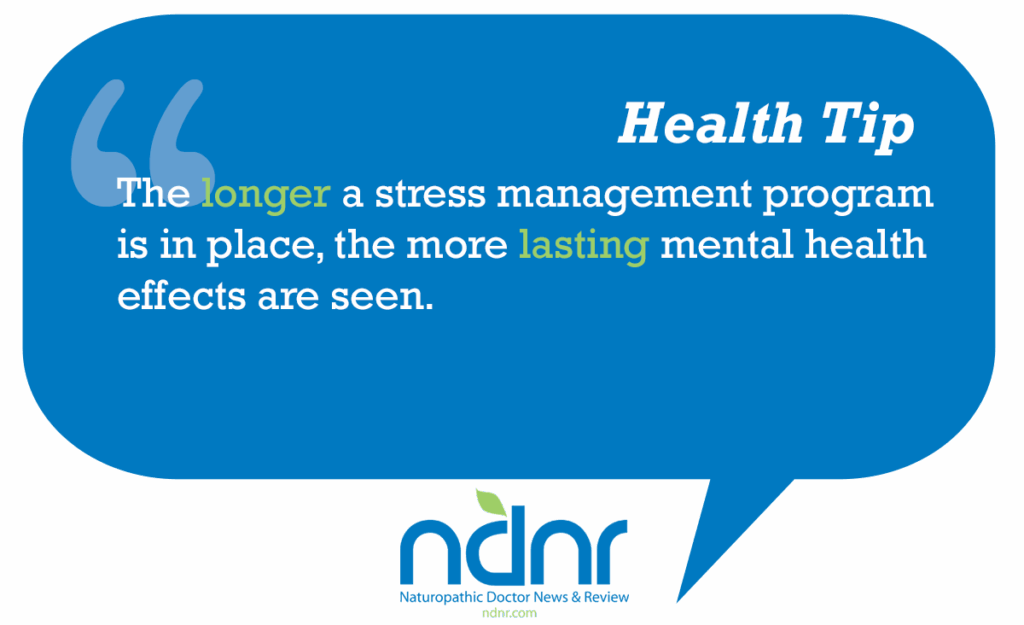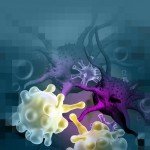Stress Management Interventions and Breast Cancer
Laura A James, ND
As NDs, we are highly aware of how much ongoing stress plays a role in the health of our patients. We routinely counsel people that exercise, mind-body techniques, wholesome nutrition and quality sleep decrease the effects of stress on the body, and that mastery of positive coping strategies prevents stress-induced complications of chronic conditions. Preventing cancer is a paramount goal of many health initiatives. Once someone gets cancer, however, these health behaviors become crucial. Not only does stress play a role in cancer development, but a person’s ability to handle stress plays a role in his or her cancer progression and quality of life.
Cancer as a Stressful Experience
The breast cancer experience challenges a woman’s mind, body and spirit intensely. Not only can breast cancer be life threatening, but treatment can be physically taxing and the psychological stress can be severe. The stre
ss of a cancer diagnosis is significant for the patient and her family, not just at the time of diagnosis, but through the disease continuum and into survivorship. A woman goes from examining life and death to coping with possible profound changes in outlook, appearance, interpersonal relationships and self-esteem. The side effects of allopathic treatment such as nausea and diarrhea, chronic sequelae of treatment like cardiomyopathy, loss of physical functioning as with lymphedema, and changes in body image such as with mastectomy would create significant stress individually, but can create monstrous stress when combined. This combination of long-term stressors and their potential effects on the survival of a breast cancer patient warrant the examination of psychological and physiological effects of stress, and techniques to manage that stress. Several recent studies have examined the stress response on various outcomes in breast cancer. Assessments included glucocorticoid sensitivity, immunity and mental/emotional parameters.
Glucocorticoid Response
Cortisol responds quickly to actual or perceived stress. Healthy recovery from stress returns cortisol levels to baseline. In the 1930s Hans Selye, renowned endocrinologist, discovered the crucial link between stress and the hypothalamic-pituitary-adrenal (HPA) axis. Selye’s description of maladaptive changes in the HPA axis – a continuum of adaptation to a persistent stressor – suggests glucocorticoid changes exist over time if healthy recovery is not attained. Cortisol levels remain elevated during chronic stress and, if recovery does not occur, ultimately bottom out. How, then, do we attain healthy recovery from a stressor? And what happens to a cancer patient from diagnosis through treatment and into survivorship? Stress management intervention at various stages of the journey can have an enormous positive impact on a cancer patient.
Van der Pompe and colleagues (1996) showed that women with early-stage breast cancer had significantly higher basal cortisol levels than healthy controls, and that women with metastatic disease had baseline cortisol levels that were even higher. These metastatic breast cancer patients also had less of a response to experimental stressors, suggesting that the long-term stress of metastatic disease left them with little cortisol reserve for future stressful events. Fatigued breast cancer survivors, women who make up 30% of the survivor population, also have a blunted cortisol response. Bower (2007) found that this response led to a lack of anti-inflammatory influence on pro-inflammatory cytokines. An unchecked inflammatory response can influence the chances of secondary recurrence, demonstrating the need for including stress management intervention as well as anti-inflammatory measures in treatment.
Studies have shown that cortisol levels decrease after stress management intervention in women with breast cancer. Cruess (2000) used cognitive-behavioral stress management intervention for 10 weeks with women being treated for Stage I or II breast cancer. Intervention participants showed increased benefit finding and reduced serum cortisol levels, whereas control subjects experienced neither change. (Benefit finding can be defined as turning a negative event into something positive or, more colloquially, turning lemons into lemonade.) In challenge, Telles-Nunes (2007) found no decrease in salivary cortisol levels in women with breast cancer after relaxation and visualization therapy (RVT). This study, however, provided only 24 days of RVT in a small population undergoing radiation therapy. The short time period of treatment and immunological effects of radiation therapy could have confounded their findings. It appears as though stress management intervention may be most effective if maintained for a longer period of time.
Immunity
Two measures of immune function have been examined in relation to stress and breast cancer: T-lymphocytes and natural killer (NK) cells. Van der Pompe (1998) looked at immune cell distribution and natural killer cell activity in 23 breast cancer patients with positive axillary lymph nodes who received tamoxifen. At baseline, patients had significantly higher absolute numbers of CD16/56 (NK) cells, and no differences were found in total lymphocyte numbers and in numbers of CD3, CD4, CD8 or CD19 (B) cells. Mild stress elicited significant increases in both NK and CD8 cells in both populations of women. The response of NK cell activity, however, appeared delayed in the women with breast cancer vs. controls. A later study from the same institution (2001) showed that women with breast cancer who underwent a three-month group psychotherapy program had NK cell values and activity more similar to that of healthy controls and that their response was less affected by the simulated stressor.
The Ohio State University’s Stress and Immunity in Breast Cancer (SIBC) study is a very thorough, multi-phase study looking at immune function in relation to stress in a breast cancer population (n=227). Over 13 years, researchers have shown that cancer-related stress correlates with impaired immunity. Andersen (1998) demonstrated decreased NK cell toxicity and T cell blastogenesis in patients exhibiting high levels of cancer-related psychological stress. In a randomized Phase III trial (2004), patients who received psychological intervention showed that T cell proliferation in response to phytohemagglutinin (PHA) and concanavalin A (ConA) remained stable or increased for patients in the intervention group, whereas both responses declined in patients receiving no psychological intervention. These same women, a subset divided into those experiencing low stress or high stress (n=17), demonstrated differences in NK cell lysis. Low-stress patients had significantly higher levels of killer immunoglobulin-like receptor CD158b and lower levels of the common lectin-type receptor subunit CD94, both markers of NK cell functionality (Varker, 2007). Current inquiry examines whether these changes in immunity are long lasting and translate into clinical health effects. More recently, 2007 data revealed that T cell blastogenesis, enhanced after a three-month intensive intervention phase, was not significant after a total 12 months of stress management intervention. Thus, increased immune cell function in vitro did not translate into clear improvements in immunity in vivo.
Clinical Health Effects of Stress Management Intervention
Psychological parameters used in the SIBC study clearly demonstrate that the longer a stress management program is in place, the more that lasting mental health effects are seen (Andersen et al, 2007). Patients in the intervention arm received four months of weekly stress management sessions, followed by monthly sessions for eight additional months. Measures included psychological, biological and health outcomes (performance status, symptom evaluation and lab values). The data show that significantly reducing stress at four months yielded better health (lower levels of symptomatology and higher functional status) at 12 months.
Stress Management Interventions
Many stress management interventions are mind-body techniques such as meditation, biofeedback and visualization, slow movement exercises like yoga or tai chi, or psychological talk therapy in its many forms. All of these techniques are designed to promote calm and engage the parasympathetic nervous system. Benson (1975) described parasympathetic activity as the “relaxation response.” This response is the full activation of the parasympathetic nervous system to counteract an overstimulation of the sympathetic nervous system. During a relaxation response, the heart rate slows, breathing slows, muscles relax and peripheral blood circulation increases. Psychologically, the relaxation response decreases anxiety and encourages a change in perception of the stressor. When the stressor is not perceived as a threat, the physiological reaction to the stressor is diminished. But practice is key: With diligent practice, these techniques can help a person to achieve full relaxation quickly when faced with a stressful event.
Mindfulness Meditation
Mindfulness meditation practice in the style that Jon Kabat-Zinn popularized more than 25 years ago is a well-examined form of stress management intervention in relation to cancer. Mindfulness-Based Stress Reduction (MBSR) studies on cancer patients repeatedly show that a multi-week group intervention with home practice enhances quality of life and decreases perceived stress (Carlson, 2004; Speca, 2000). Kabat-Zinn’s established method emphasizes a focus on the present as it is, experiencing life fully and being in touch with the full range of human emotions and sensory experiences. By paying attention to what is happening in the moment, one can cultivate a stable response to stressful events. The way a person perceives a stressful event dictates the way his or her nervous system will respond. Therefore, changing perception can profoundly change the nervous system’s response.
In relation to breast cancer, Garland (2007) compared an MBSR program and a healing through the creative arts (HA) program in more than 100 cancer outpatients. The majority of participants had breast cancer. Programs were administered over eight weeks (MBSR) or six weeks (HA). Psychological measures included post-traumatic growth (PTGI-R), spirituality (FACIT-Sp), stress (SOSI) and mood disturbance (POMS). Both programs improved benefit finding in breast cancer patients, but the patients who developed an MBSR practice also reported enhanced spirituality and reduction in stress, depression and anger.
Biofeedback
Biofeedback uses electronic equipment to monitor physiological responses. Patients can train their parasympathetic nervous system to respond quickly and completely using abdominal breathing techniques and watching their progress on the equipment monitor. Biofeedback has myriad uses throughout medicine and psychology, and can be a very effective stress management tool. Kim (2005) looked at female breast cancer patients who underwent mastectomy to determine the effects of abdominal breathing training using biofeedback on stress, immune response and quality of life. The experimental group (n=12) was provided with abdominal breathing training using biofeedback weekly for four weeks. State anxiety, cancer physical symptoms, serum cortisol, T cell subsets (T3, T4, T8), NK cell and quality of life were measured both before and after the intervention. State anxiety, symptomatology and serum cortisol were reduced after four weeks of abdominal breathing training using biofeedback, but there was no statistical significance. It showed, however, improvement in quality of life (p=.02), and T3 (p=.04).
Yoga
Banerjee (2007) looked at psychological parameters and DNA damage in 68 breast cancer patients undergoing radiotherapy. Patients were randomized to either yoga or supportive therapy for six weeks. The Perceived Stress Scale (PSS) and Hospital Anxiety and Depression Scale (HADS) were used to assess emotional distress, and DNA damage to peripheral blood lymphocytes was assessed using electrophoresis. Out of the 58 patients who completed the study, there was a significant decrease in the anxiety scores in the yoga intervention group. Anxiety levels in the control group actually went up. Depression also decreased in the treatment group, and increased in the supportive therapy-only group. Perceived stress decreased in the yoga group post-radiotherapy, whereas the control group showed no change pre- and post-radiotherapy. Post-radiotherapy DNA damage was also less in the yoga group vs. the control.
Cancer Management Imperative
Stress management is a necessary part of any program for optimum health, but in the face of a cancer diagnosis it becomes critical. The existential dialog occurs for most people diagnosed with cancer in the first 100 days (Weisman and Worden, 1976). A stress management program should be initiated during this time, and would optimally include spouses, partners, family members or other caregivers. The fatigue and side effects of conventional treatment contribute to the physiological stress that the patient experiences. Relaxation intervention can help allay the immune suppression and glucocorticoid maladaptation during this period as well. And once a patient enters survivorship, stress management techniques can help them to cope with their ongoing chronic condition.
 Laura A James, ND is a 2002 graduate of Bastyr University’s naturopathic medicine program, and is a licensed ND in private practice in Bellevue and Ferndale, Wash. She specializes in cancer, and uses food, herbs, nutritional supplements, physical therapies and lifestyle counseling to encourage patients to attain optimum mind-body balance. Dr. James is a member of the Oncology Association of Naturopathic Physicians (OncANP) and the Society for Integrative Oncology, as well as the AANP and WANP. She is also trained in biofeedback modalities for stress management and chronic symptom control. Dr. James lectures frequently on stress management and cancer for hospitals, community organizations, and cancer support groups.
Laura A James, ND is a 2002 graduate of Bastyr University’s naturopathic medicine program, and is a licensed ND in private practice in Bellevue and Ferndale, Wash. She specializes in cancer, and uses food, herbs, nutritional supplements, physical therapies and lifestyle counseling to encourage patients to attain optimum mind-body balance. Dr. James is a member of the Oncology Association of Naturopathic Physicians (OncANP) and the Society for Integrative Oncology, as well as the AANP and WANP. She is also trained in biofeedback modalities for stress management and chronic symptom control. Dr. James lectures frequently on stress management and cancer for hospitals, community organizations, and cancer support groups.
References
- Andersen BL et al: Stress and immune responses after surgical treatment for regional breast cancer, J Natl Cancer Inst Jan 7; 90(1):30-6, 1998.
- Andersen BL et al: Psychological, behavioral, and immune changes after a psychological intervention: a clinical trial, J Clin Oncol Sep 1; 22(17):3570-80, 2004.
- Andersen BL et al: Distress reduction from a psychological intervention contributes to improved health for cancer patients, Brain Behav Immun Oct; 21(7):953-61, 2007.
- Banerjee B et al: Effects of an integrated yoga program in modulating psychological stress and radiation-induced genotoxic stress in breast cancer patients undergoing radiotherapy, Integr Cancer Ther Sep; 6(3):242-50, 2007.
- Benson H et al: The relaxation response: psychophysiologic aspects and clinical applications, Int J Psychiatry Med Jan 1; 6(1-2):87-98, 1975.
- Bower JE: Inflammatory responses to psychological stress in fatigued breast cancer survivors: relationship to glucocorticoids, Brain Behav Immun Mar 1; 21(3):251-8, 2007.
- Carlson LE et al: Mindfulness-based stress reduction in relation to quality of life, mood, symptoms of stress and levels of cortisol, dehydroepiandrosterone sulfate (DHEAS) and melatonin in breast and prostate cancer outpatients, Psychoneuroendocrinology 29:448-74, 2004.
- Cruess DG et al: Cognitive-behavioral stress management reduces serum cortisol by enhancing benefit finding among women being treated for early stage breast cancer, Psychosom Med May-Jun; 62(3):304-8, 2000.
- Garland SN: A non-randomized comparison of mindfulness-based stress reduction and healing arts programs for facilitating post-traumatic growth and spirituality in cancer outpatients, Support Care Cancer Aug; 15(8):949-61, 2007.
- Kabat-Zinn J: Full Catastrophe Living: Using the Wisdom of Your Body and Mind to Face Stress, Pain, and Illness. New York, 1990, Bantam Doubleday Dell.
- Kim KS: Effects of abdominal breathing training using biofeedback on stress, immune response and quality of life in patients with a mastectomy for breast cancer, Taehan Kanho Hakhoe Chi Dec 1; 35(7):1295-303, 2005.
- Nielsen NR: Stress and breast cancer: a systematic update on the current knowledge, Nat Clin Pract Oncol Nov 1; 3(11):612-20, 2006.
- Segrin C: Interdependent anxiety and psychological distress in women with breast cancer and their partners, Psychooncology Jul 1; 16(7):634-43, 2007.
- Speca M et al: A randomized, wait-list controlled clinical trial: the effect of a mindfulness meditation-based stress reduction program on mood and symptoms of stress in cancer outpatients, Psychosom Med Sep-Oct; 62(5):613-22, 2000.
- Su F: Psychological stress induces chemoresistance in breast cancer by upregulating mdr1, Biochem Biophys Res Commun Apr 15; 329(3):888-97, 2005.
- van der Pompe G et al: Elevated basal cortisol levels and attenuated ACTH and cortisol responses to a behavioral challenge in women with metastatic breast cancer, Psychoneuroendocrinology May; 21(4):361-74, 1996.
- van der Pompe G et al: An exploratory study into the effect of group psychotherapy on cardiovascular and immunoreactivity to acute stress in breast cancer patients, Psychother Psychosom Nov-Dec; 70(6):307-18, 2001.
- van der Pompe G et al: Effect of mild acute stress on immune cell distribution and natural killer cell activity in breast cancer patients, Biol Psychol May; 48(1):21-35, 1998.
- van der Pompe G: Effectiveness of a short-term group psychotherapy program on endocrine and immune function in breast cancer patients: an exploratory study, J Psychosom Res May; 42(5):453-66, 1997.
- Varker KA et al: Impaired natural killer cell lysis in breast cancer patients with high levels of psychological stress is associated with altered expression of killer immunoglobin-like receptors, J Surg Res May 1; 139(1):36-44, 2007.
- Weisman AD and Worden JW: The existential plight in cancer: significance of the first 100 days, Int J Psychiatry Med (7):1-15, 1976.










